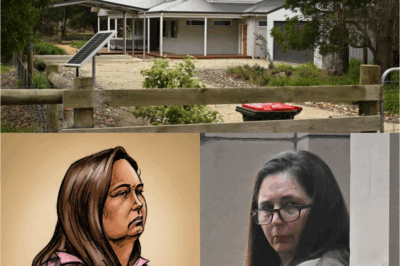Denise Welch of Loose Women Opens Up About Her Traumatic Past and Horrifying Battle with Domestic Violence

Denise Welch, beloved partner on the “Loose Women” panel, has recently opened up about her harrowing experiences with domestic violence in a courageous segment that sheds light on this critical issue.
During the episode, Welch detailed her tumultuous relationship with an ex-partner whose volatile behavior culminated in a shocking incident where he threw a table at a man simply for smiling at her in a restaurant.
This revelation not only highlights the severity of her past but also emphasizes the often-overlooked nature of emotional and physical abuse in relationships.
Understanding the Emotional and Physical Toll of Domestic Abuse

Denise’s account provides deep insight into the emotional turmoil that accompanies domestic abuse.
She spoke candidly about how her ex-partner’s charismatic facade initially enchanted her, yet it soon became a mask for manipulative and controlling behavior.
Over time, Denise felt her self-esteem diminish, her confidence eroded by her partner’s caustic remarks and possessiveness.
The charming attributes that once drew her in became twisted tools of emotional torture, leaving her to grapple with her worth and how others viewed her.
Welch illustrated numerous instances of emotional abuse, sharing vivid recounts of how her partner would belittle her social interactions, isolating her from friends and family.
This debilitating atmosphere fostered a sense of loneliness and desperation, as Denise felt increasingly trapped in a cycle of fear and humiliation.
Such relationships often feature a dangerous combination of jealousy and emotional manipulation, making it increasingly challenging for victims to break free.
The Cycle of Control: Recognizing the Signs

Denise Welch’s story is not just her own; it is a narrative experienced by many individuals caught in similarly abusive situations.
Understanding the cycle of control is crucial in recognizing and addressing these harmful dynamics. Abusers typically have histories of their own emotional turmoil, which can fuel their abusive behavior.
This background often perpetuates a pattern of insecurity and possessiveness that can lead to explosive reactions, much like what Denise experienced when her partner violently reacted over a mere smile.
Denise’s experience serves as a potent reminder of the insidious nature of such relationships. Victims frequently find themselves silenced by emotional manipulation and fear of retribution.
Sadly, many remain unaware of the abuse until it escalates to a point comparable to Denise’s experience.
By recounting her journey, Denise not only confronts her past but also raises awareness about the importance of recognizing these early warning signs.
Healing and Finding Strength After Abuse

While Denise’s story recounts pain and struggle, it also embodies resilience and hope. After enduring such a tumultuous relationship, she has rediscovered love and happiness with her current partner, Lincoln Townley.
This new chapter symbolizes a significant turnaround in her life, affirming that recovery from trauma is not only possible but achievable.
Denise’s journey to healing highlights the importance of self-love and recovery, encouraging others in similar situations to seek support and contemplate the possibility of a brighter future.
Denise now emphasizes that sharing her story serves a greater purpose—it is about empowerment and providing hope to others facing similar dilemmas.
By openly discussing her traumatic past, she aims to inspire those still trapped in the cycle of domestic violence, letting them know they are not alone and that change is possible.
It is crucial for survivors to acknowledge their experiences and seek the necessary help, whether it be through therapy, support groups, or confiding in trusted loved ones.

Denise Welch’s courage in revealing her past and her battle with domestic violence provides a poignant reminder of the need for awareness, understanding, and support for those still entrapped in abusive relationships. Her message resonates with many and sheds light on the importance of reclaiming one’s life after trauma.
News
“BANKRUPT BRITAIN?!” – Labour’s Plan to WATER DOWN Its Already Flimsy Welfare Reforms Could HURL the UK Into TOTAL FINANCIAL MELTDOWN
LABOUR is making a complete mess of welfare. Panicked and driven Left-wards by Reform’s surge, the Government is wobbling on the…
“TURKISH HOTEL TERROR!” – Brit Dad Brutally BEATEN TWICE in Front of His Kids… Family Holiday Spirals into a Living Nightmare
The alleged attackers reportedly had a feared reputation A DAD-OF-TWO said he was attacked twice in front of his kids…
“FED to PIRANHAS!” – 31-Year-Old Mum of 3 Vanishes After Ex’s Savage Revenge… Body Still Missing in Brazil
A MAN was caught on CCTV putting his former wife’s body in the boot of a car before coldly dumping…
“Dinner Party of DEATH!” – You Won’t Believe Erin Patterson’s Gross Confession After Her ‘Killer’ Mushroom Meal Claimed 3 Lives
MUSHROOM cook Erin Patterson who is accused of killing three people with a poisoned beef wellington graphically described how she…
HOLIDAY BLOODBATH! Teen SLASHED to Death with Broken Bottle in Lisbon—UK Tourist (27) DRAGGED Back to Portugal in Dramatic Midnight Extradition
Daniel was reportedly attacked while trying to defend a friend A BRITISH tourist has been arrested and extradited to Portugal…
LIVERPOOL PARADE CARNAGE! 53-Year-Old Driver PLOUGHS into Crowd—47 Injured, 4 Kids Hurt—Police Shout “NOT TERROR!” Fans in SHOCK
Emergency crews arrived to find people lying injured in the road and some trapped under the car FOUR children were…
End of content
No more pages to load












